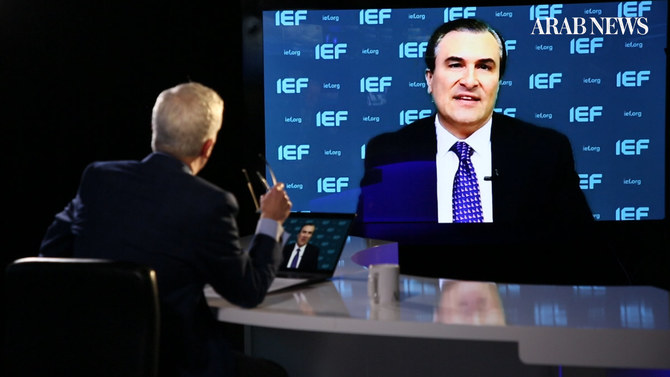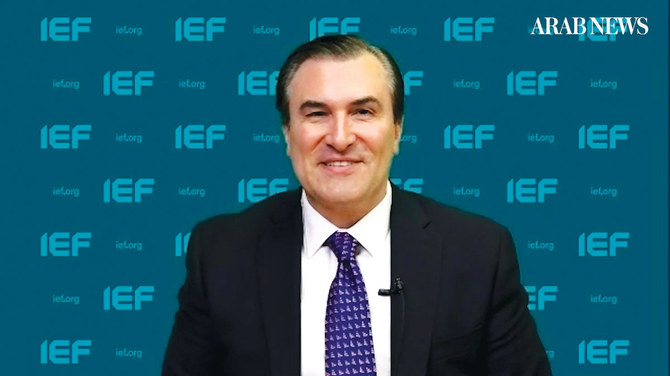DUBAI: Saudi Arabia and Russia have been commended by one of the thought leaders of the global energy industry for playing a “responsible, leadership role” via the OPEC+ alliance in stabilizing oil markets during the coronavirus pandemic.
Joseph McMonigle, secretary general of the International Energy Forum (IEF), the world’s biggest forum for energy policymakers, also spoke of the looming investment crunch in the oil industry and the crucial role that technology will play in the global battle against climate change.
He was interviewed on Frankly Speaking, the Arab News video show in which leading policymakers and business executives give their candid opinion on some of the big issues of the day.
McMonigle took over at the IEF last year after two decades’ experience in the global energy business, including a stint as adviser to the White House administration of George W. Bush.
“OPEC+ has been quite responsible in stabilizing oil markets during the pandemic, and of course like every other producer it had to adjust its demand lower, but really they took a leadership role right out of the box,” he said.
The Kingdom, alongside Russia, played a crucial role in limiting excess supply of crude onto fragile markets at the height of the crisis last year, when oil demand fell by 30 per cent and global crude prices plunged into negative territory in some markets.
“Really only due to their quick action were prices able to stabilize during the summer,” McMonigle said. “I think if we just said ‘Let’s wait and just see how market forces affect everything,’ I think it would have been a much more painful transition period.”
Nevertheless, he believes Saudi Arabia and OPEC do not want to see oil prices soaring too fast as the world recovers from the pandemic.
According to him, producers in the region and worldwide are conscious of the risks to economic growth from a “supercycle” in energy prices that some analysts have predicted.
“I don’t think that OPEC and the producers here in the region are necessarily so thrilled with supercycle type prices,” McMonigle said.
“I think they recognize, from the last time this happened, that it wasn’t good for the global economy, and I think they’ve realized now that healthy customers and a healthy global economy is the best for their industry and the best for the energy market.”
His comments came as crude oil prices hit new post-pandemic highs, with Brent crude, the global benchmark, up 20 per cent over the past month to stand at around $66 per barrel.
Some analysts have forecast the Brent will reach $75 in the summer, and could even spike to $100 as demand soars on economic recovery prospects and vaccines are rolled out across the world.
But with OPEC+ just days away from a crucial meeting to decide oil supply levels, McMonigle warned that lack of investment last year as prices plummeted could come back to bite the global industry.
“There’s not much we’re going to be able to do about demand returning faster and stronger than estimated but we can do something on the supply side, and that’s really going to take this investment that we talked about,” he said.
“If we’re in a full recovery at the end of the year from the pandemic I think you’re going to see demand be stronger and faster than forecasted, and so if you combine that with the investment crisis, I think the outlook for higher oil prices is quite good.”
The role of the IEF is to encourage dialogue and consultation between energy producers and consumers, and its work has been thrown into sharp relief by the pandemic energy crisis, as well as its effect on accelerating energy transition away from hydrocarbons.
“We have a much more diverse membership and so our agenda is expanded outside of just fossil fuels and we’re very involved in the energy transition and the role of natural gas and obviously paying very close attention to renewables,” McMonigle said.
The new emphasis on renewables — like solar, wind and nuclear energy sources — has struck a chord in Saudi Arabia, which has put in place some $10 billion worth of investment in the sector and announced plans to produce half its electricity from renewable sources by 2030.
But McMonigle also emphasized the role hydrocarbons still have to play in the global energy mix and the importance of innovative technology to mitigate the effect of harmful emissions.
“I think it’s important to recognize that wind and solar energy alone can’t really help us meet our climate goals,” he said. “We really need a shift now by governments and industry to invest more in clean energy R&D, technology and innovation, with a goal to reduce greenhouse gas emissions.
At a recent meeting of the IEF with European Union energy policymakers, Prince Abdul Aziz bin Salman, the energy minister of Saudi Arabia, underlined the Kingdom’s commitment to renewable sources, and to the use of hydrogen as a fuel of the future.
“Hydrogen is a very hot and trending topic now and I think that’s because the EU has recognized intellectually that wind and solar just can’t do it alone, and we’re not going to just go off of fossil fuels. We need a replacement and so that’s why I think they’re investing so much in hydrogen, and Saudi Arabia is getting very involved in it,” McMonigle said.
Saudi Arabia has backed the framework of the Circular Carbon Economy (CCE) as a strategy to mitigate and remove the harmful emissions that cause global warming, and that framework was endorsed by G20 leaders at last year’s summit under the Saudi presidency.
McMonigle said that the key to CCE was investment in new technology. “Up until now really it’s just been the US, maybe also the UK, Norway and Australia that have invested in it, but if Saudi Arabia is going to get behind it in a big way that’s really going to advance the technology - not just on this but on the other technologies that will help us solve our climate crisis,” he said.
One crucial technology aspect is the direct capture of carbon from the air, which is a focus of significant Saudi energy research.
The effects of climate change and extreme weather conditions were recently demonstrated in the US, where the Texas electricity network was overwhelmed by severe low temperatures that also seriously affected the state’s oil industry.
Some experts have blamed the Texas policy of renewable investment for the crisis, but McMonigle disagreed.
“Certainly, renewable energy was affected, but natural gas generation was also affected as well. I think it’s a lot more complicated than just pointing out one or two fuel sources,” he said, highlighting the once-in-a-century nature of the Texas storm and the state’s unique regulatory structure as contributory factors.
Some critics of the hydrocarbon industry predict that the rise of electric vehicles (EV) will, in the long term, contribute to the decline of petrol cars and “peak” oil demand, encouraged by environmental legislation in some countries.
“There’s tremendous momentum behind EVs. Last year there were 2.3 million EVs sold globally — that's about one in every 40 cars sold was an electric vehicle or hybrid. These numbers are only going to grow and some forecasts suggest that global EV sales will make up more than 50 per cent in most vehicles segments by the year 2035,” McMonigle said.
But that does not necessarily mean the imminent end of oil as the main global energy source, he insisted.
“Fossil fuel and hydrocarbon demand is going to continue out to 2040 and maybe some of it gets affected by EVs. But you still have jet fuel, you still have diesel, you have petrochemicals that are driving a lot of the growth,” he said.
“The point here is that you know oil is going to be a dominant energy source for the foreseeable future.”
______________________
• Twitter: @frankkanedubai























